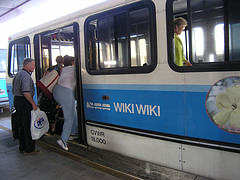 A wiki is a collaborative website and authoring tool that allows users to easily add, remove and edit content. Wikipedia, the online open-community encyclopedia, is the largest and perhaps the most well known of these knowledge sharing tools. With the benefits that wikis provide, the use and popularity of these tools is exploding.
A wiki is a collaborative website and authoring tool that allows users to easily add, remove and edit content. Wikipedia, the online open-community encyclopedia, is the largest and perhaps the most well known of these knowledge sharing tools. With the benefits that wikis provide, the use and popularity of these tools is exploding.(But what's "wiki" mean, you ask? Wiki is the Hawaiian word for fast, like the Hawaiian airport shuttle bus you see at the right. The word was brought to the Web in the 90s to describe a website that was easily and quickly editable by its users.)
Some of the benefits that make wikis so attractive are:
- Anyone (registered or unregistered, if unrestricted) can add, edit or delete content.
- Tracking tools within wikis allow you to easily keep up on what been changed and by whom.
- Earlier versions of a page can be viewed and reinstated when needed.
- Users do not need to know HTML in order to apply styles to text or add and edit content. You don't have to know how to make a webpage in order to contribute.
Discovery Resources
Use these resources to learn more about wikis:
- PCLMC's podcast on wikis
- Wiki’s: A Beginner’s Look – an excellent short slide presentation that offers a short introduction and examples.
- What is a Wiki? – Library Success wiki presentation.
- Using Wikis to Create Online Communities – a good overview of what a wiki is and how it can be used in libraries.
Discovery Exercise
For this discovery exercise, you are asked to take a look at two or more library wikis and blog about your findings. Here’s a few examples to get you started:
- SJCPL Subject Guides – a pathfinder wiki developed by the St. Joseph County Public Library system
- Book Lovers Wiki - developed by the Princeton Public Library
- Library Success: A best practices wiki
- The Bull Run Library wiki - a public library wiki (also a Learning 2.0 participant)
- Library Instruction Wiki - with handouts, tutorials, and more
- Other library wiki examples

No comments:
Post a Comment